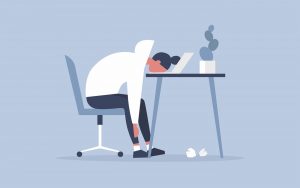 As our world, our country, our states, our towns, and our communities work hard to address the many aspects of the COVID-19 pandemic, each of us has another internal challenge that requires our constant attention – How do we manage living with so much uncertainty?
As our world, our country, our states, our towns, and our communities work hard to address the many aspects of the COVID-19 pandemic, each of us has another internal challenge that requires our constant attention – How do we manage living with so much uncertainty?
It’s one thing to be unsure about tomorrow’s weather or the time of a flight arrival, but the uncertainty that COVID-19 brings is over the top. We don’t know when the economy will get going again, when or if we will return to our former workplaces, whether we will have a second wave of the virus, what will happen to cities that re-open prematurely, how schools will function. The list of unknowns is daunting.
In an article titled, Science Explains Why Uncertainty Is So Hard on Our Brain, writer Markham Heid explains why we human beings struggle with uncertainty. Apparently, fear of uncertainty (AKA fear of the unknown) is one of strongest fears that human beings have. It is at the root of many anxiety disorders, panic attacks and depressed states.
Uncertainty is a disruptor. It interrupts the brain’s routine and habitual thoughts, assumptions, and decision-making processes. Uncertainty makes planning difficult and creates a sense of danger or foreboding. Tasked with trying to figure out what will happen next, the brain kicks into high gear. It generates survival-oriented mental processes such as hyper-vigilance, emotional reactivity, catastrophic thinking and obsessive worry.
What helps the brain manage uncertainty? Anything that takes it (and you) out of worry, obsession, emotional reactivity, and catastrophic thinking. Anything that puts it (and you) in the present moment.
Plan for the day – not for the year. Jot down manageable goals of things that you can accomplish here and now (or over the next few days) that will make you feel a sense of accomplishment and control. Examples: clean one room, clear out one closet, reconcile your bank account, put away your clothes, fix something that’s broken, start one creative project, plan a Zoom get-together.
Focus on the things you can influence, not the things you can’t. You can’t control which states open their businesses at what point in time. You can’t control whether your industry is going through a rough time. You can look for opportunities to reconfigure your work life in a way that makes more sense to you. Look for where your power lies, and focus there.
Slow down. This may sound silly. Why would you want to slow down when your brains tells you to hurry up? Because slowing down will help you manage uncertainty from a clearer, calmer place. Worry, anxiety and obsessive thinking do not help with uncertainty. Being present does. Slowing down may mean that you stop, breathe, and enjoy the breakfast you’re eating. It could involve watching the birds outside your window as they fly and perch. Slowing down may mean you take just a few minutes to practice meditation every morning, or it could entail a break from work where you breathe slowly and deeply three times. The idea is to slow your system down enough to reduce the chatter in your brain.
Limit your intake of news. Afraid of what could lie ahead, the brain projects gloomy hypotheticals and worse case scenarios. It then looks for confirmation. News outlets often feed into that anxiety with their attempts at predicting future events. Studies show that too much information overwhelms the brain, leaving it confused and distressed. Try to put strict limits on the amount of news that you ingest. It will improve your ability to manage uncertainty.
Living with this degree of uncertainty is challenging for everyone. Appreciating that our brains have trouble with the unknown can inspire us to manage the anxiety and emotional reactivity that comes with the many unknown outcomes of the current pandemic.
Katherine Crowley – Career Therapist and co-owner of K Squared Enterprises
Contact us at info@mycrazyoffice.co for any further help around this topic.

 I don’t know about you, but I hate to wait. When faced with a long line at a store, a movie, a food bar or even a gas station, I’m the person who opts out, returning at another time when I won’t have to wait. In fact, until March of this year, waiting for anything seemed like an immense waste of time to me.
I don’t know about you, but I hate to wait. When faced with a long line at a store, a movie, a food bar or even a gas station, I’m the person who opts out, returning at another time when I won’t have to wait. In fact, until March of this year, waiting for anything seemed like an immense waste of time to me. So here we are. For many people this is week six (or more) of sheltering in place.
So here we are. For many people this is week six (or more) of sheltering in place. As many of us move through another week of being Sheltered in Place, it becomes increasingly more challenging to break away from the continuous demands of home, work, family, child care, elder care, animal care, and take a moment for ourselves. Without any boundaries or breaks between home life and work life, hard workers just work harder, depleting their energy to the point of either freaking out, blowing up or collapsing from exhaustion. You may find yourself feeling depressed, unfocused, or less productive than usual. For any and all of these circumstances, self-care can help.
As many of us move through another week of being Sheltered in Place, it becomes increasingly more challenging to break away from the continuous demands of home, work, family, child care, elder care, animal care, and take a moment for ourselves. Without any boundaries or breaks between home life and work life, hard workers just work harder, depleting their energy to the point of either freaking out, blowing up or collapsing from exhaustion. You may find yourself feeling depressed, unfocused, or less productive than usual. For any and all of these circumstances, self-care can help. One message that we are all hearing over and over again is that the current state of affairs is going to last for a while. It’s clear that, from an emotional endurance point of view, we are looking at a situation that is more of a marathon than a sprint. With that in mind, here are some tips for managing your emotional and mental health while living and working with the pandemic.
One message that we are all hearing over and over again is that the current state of affairs is going to last for a while. It’s clear that, from an emotional endurance point of view, we are looking at a situation that is more of a marathon than a sprint. With that in mind, here are some tips for managing your emotional and mental health while living and working with the pandemic. Without question, these are uncertain times. Daily routines, work lives, economic conditions and social lives have been uprooted and disrupted. Homes now serve as offices, school rooms, infirmaries, and personal gyms. We don’t know when we will get our normal lives back again.
Without question, these are uncertain times. Daily routines, work lives, economic conditions and social lives have been uprooted and disrupted. Homes now serve as offices, school rooms, infirmaries, and personal gyms. We don’t know when we will get our normal lives back again.

Looking to advertise with us?
We have sponsorships available on the My Crazy Office Podcast.
Please email us at info@mycrazyoffice.co.
Podcast: Play in new window